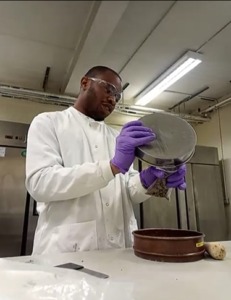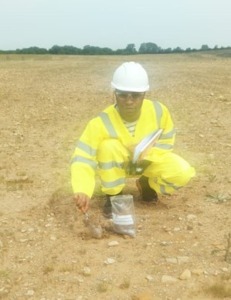Exploring the world beneath our feet!
11/10/2023

Hi readers! I’m Marvellous Christopher Etuk, an environmental engineer passionate about restoring degraded ecosystems through soil science. I recently completed my MSc in Environmental Engineering at Cranfield University in the UK. Through my MSc thesis, I got linked with Hanson, UK who are my sponsors for the project on microbial community structure in restored quarried grasslands. In addition to the data skills in principal component analysis, I have garnered fine skills from field-to-lab experience in visual soil assessment, phospholipid fatty acid analysis (PLFA), microbial biomass, and available nitrogen and phosphorus through this project. These experiences showed me how applied science can develop sustainable solutions tailored to local contexts. As an emerging steward of our shared planet, I’m eager to join mission-driven organizations advancing biodiversity conservation, regeneration, and land restoration. I also hope to continue pursuing research uncovering novel nature-based strategies to add to the pool of scientific bodies and benefit communities.
On this blog, I look forward to sharing my perspectives as an early career scientist. From exploring soil microbiomes to highlighting promising technologies, I aim to make science accessible while driving impact. I believe ecology should empower, not overwhelm us. Let’s grow our wonder for the living world! I’m glad you’re joining me on this journey to dig into our marvellous planet. Let’s get started!
When we think of biodiversity, oftentimes the focus is on larger lifeforms we can see above ground; big animals like elephants or trees probably come to mind. But did you know there’s a whole hidden world of diversity living right beneath our feet?
Inside every spoonful of soil are billions of tiny living things – algae, fungi, bacteria, protozoa. Together, these microscopic soil organisms are called microbiomes. Though invisible to our eyes, soil microbiomes powerfully impact ecosystems and our lives. Much like how COVID brought societies to a halt, soil organisms exert tremendous invisible influence.
Growing up, I learned it’s often the smallest things that have the biggest effects. The fertile soils that grow our food rely on the diversity of microbial communities living symbiotically with plant roots. These microbiomes recycle nutrients, store carbon, unlock essential minerals for vegetation (above-ground biodiversity), and even regulate the entire planet’s climate! Yet modern practices from tillage to pesticides can disrupt these essential partnerships, throwing off natural balances.
Soil microbiomes let ecosystems flourish the way our gut microbiome keeps us healthy. And we’re just beginning to unlock their incredible secrets! Hanson and Ketton Quarry are using innovative tools to study how land management choices impact these communities. Just like how a doctor analyses your microbiome to offer health advice, soil samples help experts recommend steps to restore the habitats of these soil microbiomes. Hanson and Ketton Quarry actively work to conserve and rebuild microbial biodiversity through sustainable land management strategies tailored to local ecology. Recent research by myself and colleagues evaluating quarry restoration sites, particularly at Ketton Quarry found management options ranging from reduced soil disturbance, and seed mixes to organic amendments can help improve belowground diversity.
Here are three simple ways YOU can help conserve these soil microscopic helpers:
- Grow native plants – their roots nourish unique underground species.
- Reduce chemical fertilizers and pesticides – they harm essential fungi and bacteria.
- Limit soil disturbance – tillage and compaction disrupt delicate communities.
By getting smart about belowground biodiversity, we can nourish healthier soils to grow more resilient crops, support carbon storage, and maintain the interconnected web of life. When it comes to conservation, small things count in a very big way! What are you doing to take care of the little things? So, let’s spread the word to get others excited about the tiny ecosystems under their feet with conservation at the forefront!!


Categories & Tags:
Leave a comment on this post:
You might also like…
Company codes – CUSIP, SEDOL, ISIN…. What do they mean and how can you use them in our Library resources?
As you use our many finance resources, you will probably notice unique company identifiers which may be codes or symbols. It is worth spending some time getting to know what these are and which resources ...
Supporting careers in defence through specialist education
As a materials engineer by background, I have always been drawn to fields where technical expertise directly shapes real‑world outcomes. Few sectors exemplify this better than defence. Engineering careers in defence sit at the ...
What being a woman in STEM means to me
STEM is both a way of thinking and a practical toolkit. It sharpens reasoning and equips us to turn ideas into solutions with measurable impact. For me, STEM has never been only about acquiring ...
A woman’s experience in environmental science within defence
When I stepped into the gates of the Defence Academy it was the 30th September 2019. I did not know at the time that this would be the beginning of a long journey as ...
Working on your group project? We can help!
When undertaking a group project, typically you'll need to investigate a topic, decide on a methodology for your investigation, gather and collate information and data, share your findings with each other, and then formally report ...
From passion to purpose: My journey at the Pinnacle of Aviation
By: Sultana Yassin Abdi MSc Air Transport Management, Current Student Born and raised in the vibrant landscape of the UAE, with roots stretching back to Somalia, my life has always been ...






